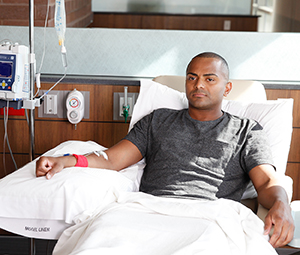What is chemotherapy?
Chemotherapy, or chemo, uses strong medicines to kill cancer cells. The medicines attack and kill cells that grow quickly, like cancer cells. Some normal cells also grow quickly. Because of this, chemo can also harm those cells. This can cause side effects.
How is chemotherapy given for laryngeal cancer?

Chemo for laryngeal cancer is given as a liquid right into your blood through a vein. Chemo may be used alone or along with other cancer treatments.
Chemo may be done as an outpatient visit to a hospital. This means you go home the same day. Or, it may be done at your healthcare provider’s office or an infusion center. In some cases, you may stay in the hospital during treatment. This depends on the medicines, your treatment plan, and your overall health.
Most people get chemo in cycles. That means you get chemo for a set amount of time, and then you have a rest period. Each period of treatment and rest is one cycle. You may have several cycles. Having treatment in cycles helps by:
-
Killing more cancer cells. The medicine can kill more cancer cells over time because cells aren't all dividing at the same time. Cycles allow the medicine to fight more cancer cells.
-
Giving your body a rest. Treatment is hard on other cells in your body that divide quickly. This includes cells in the lining of your mouth and stomach. This causes side effects, like mouth sores and nausea. Between cycles, your body can get rest and recover from the chemo.
-
Giving your mind a rest. Getting chemo can be stressful. Taking breaks between cycles can let you get an emotional break between treatments.
What are common side effects of chemotherapy?
Side effects are common with chemo. They tend to be worse with chemoradiation therapy. But it’s important to know that they can often be controlled and even prevented.
Side effects depend on the type of medicines you get and the doses used. Chemo affects any cells that grow quickly. That includes cancer cells as well as healthy cells in your bone marrow (where new blood cells are made), digestive system, and your hair and skin.
During treatment, you will have many blood tests done. If your number of white blood cells drops during chemo, you're at a greater risk for infection. You should tell your healthcare provider right away about any fever you have during chemo. A fever higher than 100.4°F (38°C) is a possible sign of infection.
If your platelets, the blood cells that help with clotting, are low, you may bruise or bleed more easily. Tell your healthcare provider right away if you notice this.
Your red blood cells carry oxygen from your lungs to all other parts of your body. The number of these cells in your blood may also drop during chemo. This is called anemia. If they go too low, a blood transfusion may be needed.
These are some symptoms of anemia:
These are other possible side effects from chemo:
-
Appetite loss
-
Constipation
-
Diarrhea
-
Hair loss
-
Mouth sores
-
Nausea
-
Vomiting
-
Skin and nail changes
Some chemo medicines cause certain other side effects. For instance, some of the medicines commonly used for laryngeal cancer cause nerve damage, called peripheral neuropathy. This can lead to numbness, tingling, and pain in your hands and feet. Some chemo medicines used for laryngeal cancer can also cause ear problems, such as ringing ears or hearing changes.
Tell your healthcare team about any side effects you have right away. Make sure to ask what kind of problems you should watch for. There are often things that can be done to help you deal with side effects and keep them from getting worse. There may be things you can do to try to prevent side effects, too. Most side effects go away over time after treatment ends.
It may be helpful to keep a diary of your side effects. Write down physical, thinking, and emotional changes. A written list will make it easier for you to remember your questions when you go to your appointments. It will also make it easier for you to work with your healthcare team to make a plan to manage your side effects.
Working with your healthcare provider
It's important to know which medicines you're taking. Write down the names of your medicines. Ask your healthcare team how they work, what they're for, and what side effects they might cause.
Talk with your healthcare providers about what signs to look for and when to call them. For instance, chemo can make you more likely to get infections. Make sure you know what number to call with problems or questions. Is there a different number for evenings, holidays, and weekends?